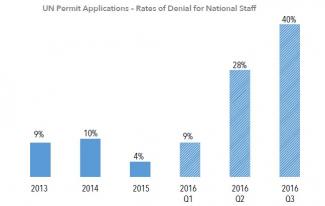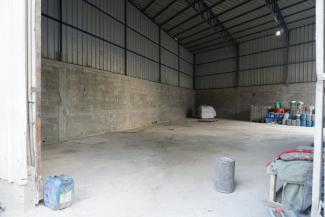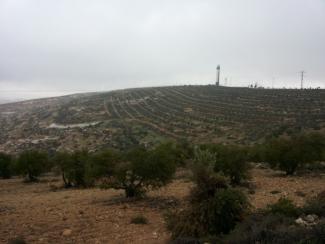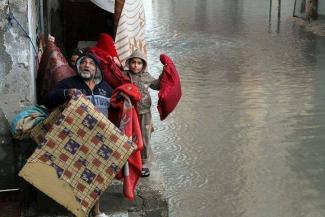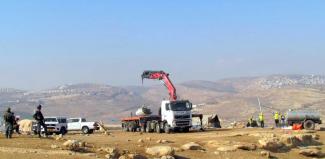Israeli restrictions on the entry of national staff of aid organizations to and from the Gaza Strip have intensified during 2016. The denial rate for permit applications by national staff of UN agencies surged from four per cent in 2015 to 40 per cent in the third quarter of 2016 (see table). Available information indicates that the rate of denial for national staff of other humanitarian agencies has also risen.
The Monthly Humanitarian Bulletin | November 2016
Only 16 per cent of the 11,000 homes totally destroyed in 2014 have been rebuilt. Low-lying areas in Gaza face risk of flooding, which could affect up to 500,000 people, as well as 64 schools and 10 health centers. Denial rate for permit applications by UN national staff to enter or leave Gaza increased dramatically during 2016. The de facto expansion of Asfar settlement (Hebron) has had a negative impact on the living conditions of Palestinian families in nearby communities, and exacerbated the risk of displacement of two communities.
In this document
Additional restrictions imposed by Israel from April 2016 on the entry of building materials into the Gaza Strip, have slowed the pace of reconstruction of homes destroyed or damaged during the 2014 conflict, and prolong the vulnerability of more than 10,000 families who are still displaced.
Since 1967, about 250 Israeli settlements and settlement outposts have been established across the occupied West Bank, including East Jerusalem. This violates Article 49 of the Fourth Geneva Convention which prohibits the transfer by the occupying power of its own civilian population into the territory it occupies.
As the rainy season approaches, thousands of families in the Gaza Strip will once again be at risk of temporary displacement and the destruction of assets due to flooding. The winter weather conditions are expected to exacerbate the already fragile living conditions and livelihoods of large segments of the Palestinian population. The Water, Sanitation and Hygiene (WASH) cluster and its partners have identified flood risk areas throughout the Gaza Strip, potentially affecting nearly 500,000 people, as well as 64 schools and 10 health centres.
In his 23 November briefing to the Security Council, the Under-Secretary General for Humanitarian Affairs, Stephen O’Brien, warned of the increasing challenges facing the humanitarian community and its ability to deliver assistance to Palestinians in need. This month’s Humanitarian Bulletin highlights some of the challenges in blockaded Gaza Strip.
